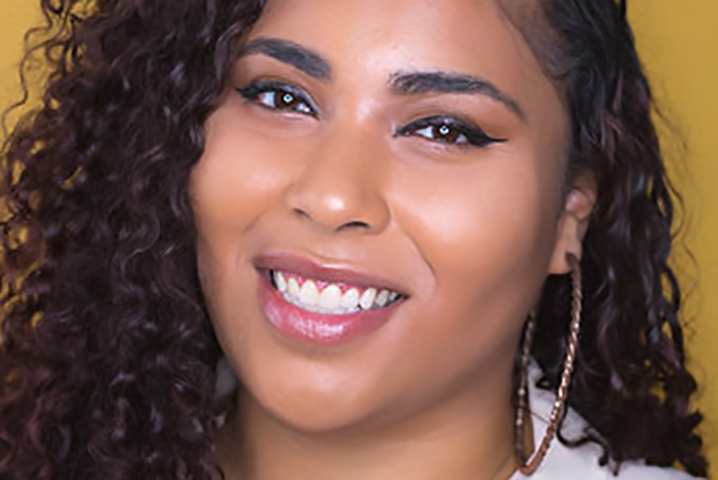
This piece was produced for Badger Vibes, our collaboration with the Wisconsin Foundation and Alumni Association.
 Originally from the south side of Chicago, Sarah Bruno came to UW–Madison in 2011 as a First Wave hip-hop and urban arts scholar looking to interpret her identity and culture as a Puerto Rican artist.
Originally from the south side of Chicago, Sarah Bruno came to UW–Madison in 2011 as a First Wave hip-hop and urban arts scholar looking to interpret her identity and culture as a Puerto Rican artist.
“I have always listened to hip-hop and reggaeton,” Bruno says.
She describes her first couple of years on campus as navigating the reality of being Puerto Rican with dark skin. Not knowing which survey boxes best illustrated her identity, she soon began to pursue a better understanding of it.
“It was 2011. ‘AfroLatinidad’ wasn’t as common a name as it is now,” she says. “The words to describe these racial categories and experiences did not exist outside of higher academic spaces at that point in time.”
The young scholar eventually joined the Ronald E. McNair Postbaccalaureate Achievement Program, where she was able to further explore her questions about culture and race. Today Bruno’s research interests include the Caribbean, specifically Puerto Rico; Hurricane Maria; race; gender; and violence.
Now a cultural anthropology PhD candidate at UW–Madison, Bruno looks at the intersection of culture, music, and identity with a new Chicano and Latino studies course called Latinx in Reggaeton and Hip-Hop: An Exploration of Blackness, Feminisms, and Performance.
“I was thinking about what classes I want to teach, what departments I’d want to be in, and that’s really how this class came to be,” Bruno says. According to the course description, students are tasked with analyzing the sexual, economic, and political agency of women in reggaeton and hip-hop genres. Students are required to participate in discussions and produce two papers, but they also have the opportunity to present an artistic final project that draws from larger theories introduced in the course.
“I felt like the spaces that intrigue me most — and are really fruitful to teach from — [are] music and pop culture,” she says. “And I knew enough about them and had reached a level of expertise in those areas to teach a course on it.”
Deciding whether to include hip-hop as a major topic in the course was a challenge for Bruno. Her final decision was to include hip-hop narratives to engage new genres such as Spanish trap, and other similarities between reggaeton and hip-hop.
Students enrolled in the course have taken a journey through Audre Lorde, bell hooks, Juan Flores, Raquel Rivera, and many other scholars. Each week they tackle subjects such as colorism, colonialism, and queer representation in reggaeton and hip-hop.
“I feel like, in order to talk about [topics] at the level of intellectual rigor that I expect my students to talk about them, I have to give them a foundation and framework for hip-hop,” Bruno says. “I think finding ways of elevating narratives that aren’t typically centered was not challenging — but it was something to be cognizant of.”
Whether students write raps covering theoretical frameworks or create an EP and listening guide for a final project, Bruno gives them space to be thoughtful and creative in their projects. As a group project, some students were asked to create a Twitter Talk as a requirement for the course, which will be used as a space for discourse: with a set number of questions, students’ friends and classmates are asked to have a thoughtful, public, online discussion about topics introduced in the class.
“I think that they are rising to the occasion,” Bruno says.
“When my students email me in the middle of the night and say, ‘Hey, I was just thinking about this,’ I think, ‘Yes! I’m getting to them,’ ” she says. “I think if I can get them to think about class content outside of class and have conversations that they wouldn’t have had before this class, then that’s why I like teaching.”
Bruno says that although she could continue to do only research, she wants to teach and inspire people to research what interests them. Her syllabus for the course is full of sources she credits with helping her understand both her own identity and interests in academia, including The Afro-Latin@ Reader edited by Miriam Jiménez Román and Juan Flores.
“My students will come up to me and be like, ‘I think I’m privileged,’ and I’ll be like, ‘Cool, let’s talk about it,’ and I think that’s important. I’m thinking very critically about who I am and how I’ve come to know who I am,” she says.
“More and more people are taking up the mantle to make these experiences widely known and give younger people the words for what they are,” Bruno says, adding that as a scholar of color she is held directly accountable to her community — therefore, her teachings come from her real, lived experiences.



